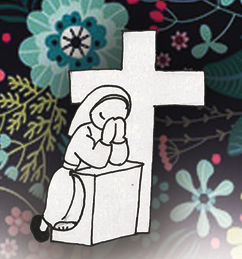Caritas Christi Urget Nos The Love of Christ Impels Us L'amour de Christ Nous Presse
RECOLLECTION Guide

MONTHLY RECOLLECTION GUIDE 2025 |

Introduction
As Sisters of St. Paul of Chartres, we are called to be pilgrims of hope, journeying together with hearts rooted in God’s promise and eyes set on His vision. In a world filled with uncertainty, our vocation challenges us to bring Christ’s hope into every community we serve. As Spes Non Confundit reminds us, “Hope does not disappoint because the love of God has been poured into our hearts” (Rom 5:5).
This monthly recollection guide invites us to reflect deeply on our mission, nurturing a hope that inspires and strengthens us to be active bearers of God’s light. In our faith sharing, we will engage in spiritual conversations structured in three rounds as we have already been doing. In the first round, we will listen to one another without interruption, creating a space for each person’s insights and feelings to be shared.
In the second round, we will reflect on and share on what we have heard. Finally, in the third round, we will express our personal commitments moving forward, articulating how we can embody and share God’s hope in concrete ways. May this time of reflection draw us closer to God, renew our commitment to His call, and empower us to carry His hope to those around us. Let us embrace this sacred practice, trusting that through these conversations, we will be strengthened and inspired to fulfill our mission with renewed zeal and commitment.
JULY 2025
THEME: Youth - The Embodiment of Hope
INTRODUCTION:
This month we focus on the inspiring theme of “Youth—The Embodiment of Hope.” This time together is an opportunity to reflect on the energy, potential, and future that our youth represent and how their journey aligns with our own spiritual paths. May this time of reflection inspire and renew our spirit, filling us with the same hope and energy that our youth embody.
GRACE:
Lord, I beg for the grace to see the world through the hopeful eyes of our youth, to be invigorated by their enthusiasm, and to support and guide them as they navigate their journey of faith and life.
SCRIPTURE TEXT: Jeremiah 29:11
“For I know the plans I have for you,” declares the Lord, “plans to prosper you and not to harm you, plans to give you hope and a future.”
CORRELATED READING: Spes non Confundit #12
Signs of hope are also needed by those who are the very embodiment of hope, namely, the young. Sadly, they often see their dreams and aspirations frustrated. We must not disappoint them, for the future depends on their enthusiasm… Let us draw close to the young, for they are the joy and hope of the church and of the world!
POINTS TO PONDER AND PRAYER EXERCISES:
Begin with this prayer: Lord, help me to understand and cherish the hope that our youth embody. Make me a patient mentor and loving companion on their journey. Inspire me with their energy and vision so that I may renew my own faith and commitment to Your service.
- Embracing Hope in My Life: Meditate on Jeremiah 29:11. Reflect on how hope has played a role in your own spiritual journey. How can you embody and share this hope with the youth in your community and in your ministry?
- Reflecting on My Role as Mentor and Guide: Reflect on Spes non Confundit #12, consider the role of mentorship in your life and the importance of inter-generational dialogue. How can you guide and support the younger generation, especially the young sisters? Reflect on specific ways you can actively participate in their spiritual growth.
- Renewing My Commitment: As you end your prayer and reflection, renew your own commitment to hope and faith. How can the hopeful vision of youth invigorate your own spiritual life and commitment?
End by thanking the Lord: O gracious God, I thank You for the gift of youth and the hope they bring into our world. Let me carry their spirit within me, embracing the future with faith and trust in Your divine plan. Amen.
POINTS FOR SHARING:
- Share your experiences of mentoring young people or young sisters. How has this relationship influenced your understanding of hope and the role of youth in the church and society?
- Brainstorm ways your community can actively support and nurture the hope embodied by youth. What projects or activities can you undertake together to make a tangible impact?
